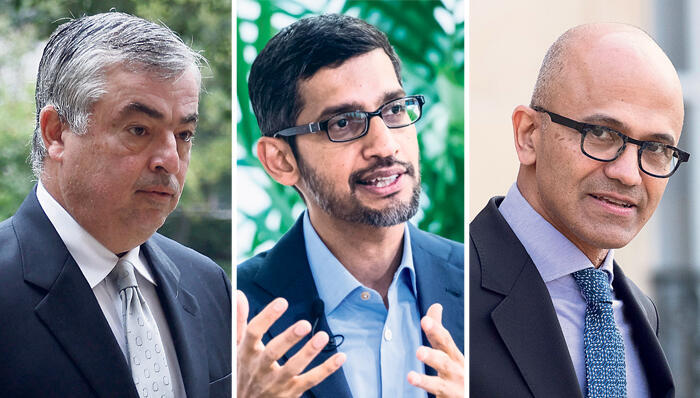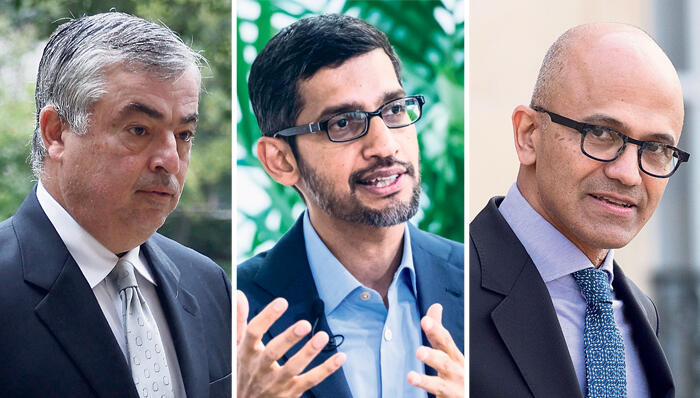
The Google tribunal: US Justice Department claims Google's default prevents competition
As a series of senior executives from the technology sector testify in the trial against the search giant, the big question is: Did Google use its power to hurt competitors or is it simply the best?
Two weeks ago, the antitrust trial against Google opened in the United States, in what is undoubtedly the largest of its kind since Microsoft faced a similar trial in the late 1990s. The U.S. Justice Department worked for three years to prepare the lawsuit and now accuses Google of maintaining its dominance in internet search through restrictive contracts and paying over $10 billion a year to a variety of cellular companies such as Samsung and Apple, to ensure that the search engine will be set as the default on mobile phones and computers. Google, for its part, is fighting back: it has recruited hundreds of employees and three leading law firms, and has so far spent millions of dollars on legal expenses and lobbyists.
While Microsoft was on trial, the richest man in the world at the time (and today still one of the richest in the world) Bill Gates was in the headlines, week after week. The public exposure was enormous, and in some ways it was a defining event for Microsoft, which has since tried to brand its corporate activities as less predatory. When Gates submitted an affidavit to the court, Microsoft tried to block it from becoming public and failed, because it was considered essential to the public interest. The Google trial today is no less big or important to the public, yet the public exposure of the trial is not high, almost boring. One of the main reasons for this is Judge Amit P. Mehta's determination not to allow the trial to be broadcast to the general public, and to accept part of Google's arguments not to reveal various testimonies and documents. In his decision, he reasoned that this, among other things, is due to the lack of authority and "grave concerns" for privacy due to the "unique sensitivity" of the procedures in question.
1 View gallery


Microsoft's Satya Nadella (from right), Google's Sundar Pichai, and Apple's Eddy Cue.
(Photo: AP, AFP, Blommberg)
As a result, large parts of the trial, which is expected to last about ten weeks, are not only not broadcast to the public but also closed to the public or the media for coverage. According to Matt Stoller, a political activist turned journalist known for his work on centralization and monopolies, about half of the trial is held behind closed doors.
You can't escape the irony. Google, which has become synonymous with the erosion of user privacy, through which it has achieved such a dominant position in the search market that generates profits of tens of billions of dollars a year, uses the argument of privacy to defend the same tactics for which it is on trial.
What does come out to the general public from the trial, sometimes comes without context and without documents of great importance. For example, internal correspondence of Google executives, presentations concerning the strategic value the company attributes to the browser, as well as some of the testimonies, not all of which have been transcribed to public platforms for a renewed and in-depth review.
What was nevertheless opened to the general public reveals quite a bit about the claims of the state and Google's competitors. This is the case, for example, in the testimony on Monday of Microsoft CEO Satya Nadella, who explained that the fact that Google has been successful for years in embedding its search engine as the default in many mobile devices and browsers - including Firefox, Apple's Safari and others - has eroded all competition in the field. "Defaults are the main things where network effects are created in digital products,” Nadella said, “Users can like a product, but won't switch a default... This whole notion that users have a choice... is completely bogus. The default is the only thing that matters in terms of changing the search behavior. You get up in the morning, you brush your teeth and search on Google. The only way to change that is by changing the default."
Google maintains a uniform line of defense: it is easy to change search settings, even if they are embedded by default. The reason that users absolutely choose Google's search engine and that the company's dominance is so consistent is because Google has developed an excellent product, which others simply cannot compete with.
Nadella is not the only one who claimed during the trial that the default does not allow any competition. The developer of the competing search engine Neeva, created by a former Google Ads executive, also testified that various cell phone companies claimed to him that the contracts they have with Google regarding the default search engine make it difficult for them to offer the engine he developed as an option to customers. Last May the company was closed.
Apple, on the other hand, was asked in court why they entered into agreements with Google in the first place, and in the open testimony of Eddy Cue, Apple's senior vice president of services, he admitted that if there were no such agreements, Apple would consider developing its own search engine. This actually supports the lawsuit's claim that Google succeeds through its dominance not only in eroding competition, but in practice also in excluding a strong potential rival from the competition completely. However, Cue emphasized that, in the spirit of Google's claims, Apple is setting Google as the default search engine because it provides the best experience for users. "There is no other legitimate alternative," he said, "Google is the default search engine because we've always thought it was the best."
Apple further explains that they easily allow users to change the default, but this claim is also subject to trial. Gabriel Weinberg, the CEO of the search engine DuckDuckGo, which holds about 2.5% of the global search market, claimed in his testimony that it is difficult to replace the default. "The replacement is much more difficult than it should be," he said, "there are too many steps," in total 15 according to his claim. Google, on the other hand, explained that Microsoft also sets the Bing search engine by default, but users quickly choose to switch to Google. "It's four keystrokes on the phone," said John Schmidtlein, the lawyer who represents Google, "go to the settings, tap Safari, then search engine, then select. It's a matter of seconds."
The evidence also gives an glimpse into the future that many are dealing with today - artificial intelligence. Since the current wave of interest erupted in December 2022 with the launch of OpenAI's ChatGPT, there have been those who have argued that Microsoft's aggressive entry into investing in the company is likely to allow it to perhaps finally challenge Google's dominance in search. Microsoft did integrate the chatbot into its Bing search engine, and the estimates were that its integration would fundamentally change the way people search on the internet and help Microsoft become a real competitor in the field. But the announcements about the change of the search era were premature. Nadella explained that competition in the age of artificial intelligence is even tougher because Google has dominance in search and therefore in content.













